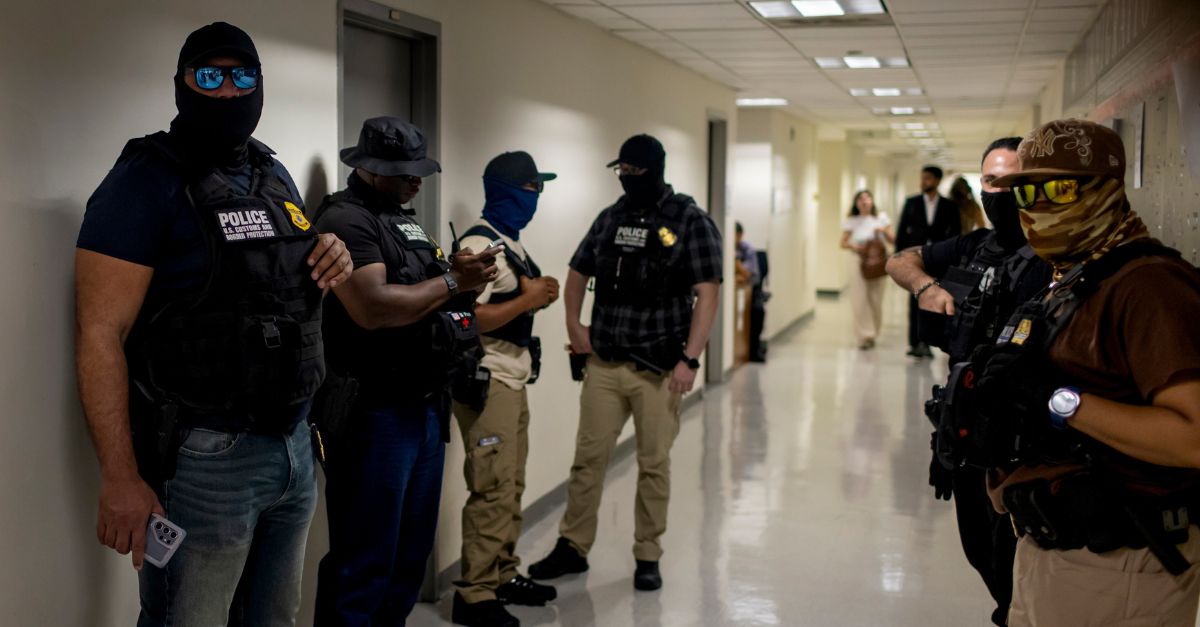Share this @internewscast.com
President Donald Trump speaks while signing an executive order regarding drug pricing in the Roosevelt Room of the White House in Washington, on Monday, May 12, 2025 (AP Photo/Mark Schiefelbein).
The Trump administration on Wednesday faced sharp criticism from the judiciary concerning its practice of deploying Immigration and Customs Enforcement (ICE) agents to arrest individuals in immigration court.
In the case at hand, Carlos Javier Lopez Benitez, a Paraguayan immigrant, claimed he was “violently detained” during one of these ICE operations at a routine immigration hearing in New York City in late July. After being transferred to an ICE facility near Houston, his lawyers submitted a petition for a writ of habeas corpus.
In a 31-page amended opinion and order, U.S. District Judge Dale Ho, appointed by Joe Biden, officially granted the petition and concluded the case. Previously, he had already ordered Lopez Benitez’s release and return from Texas in a bench ruling earlier this month.
The court unequivocally criticized several foundational aspects of President Donald Trump’s intensified deportation policies, identifying them as breaches of the Fifth Amendment’s due process clause.
While the details of the case are largely unknown, with many of the filings under seal, the government opposed Lopez Benitez’s release.
Ho, for his part, relays the basic contours in a helpful summary.
“In summary: Mr. Lopez Benitez has resided in this nation for over two years, works in construction, and has no criminal record,” the opinion states. “He is seeking asylum and willingly attended a scheduled immigration court appearance. After the hearing, masked federal officers abruptly appeared, forcibly separated him from his U.S.-citizen siblings, and confined him in a room without a bed or shower access for three days before transporting him across the country. They provided no justification for these actions until over a week later, when they filed their response to Mr. Lopez Benitez’s petition.”
The major issues in the case were threefold: what immigration statute Lopez Benitez was legally subject to; whether his detention under the proper statute violated the due process clause; and, if his detention was unconstitutional, whether he had to first go through immigration courts to vindicate his constitutional claims.
The judge marches through each of those three questions – and answers them conclusively in the petitioner’s favor.
Ho noted that, since 2023, “for more than two years,” the government “consistently” said Lopez Benitez was subject to a statute which considered his detention “discretionary.” That only changed last month, when the Trump administration shifted course to say Lopez Benitez was subject to a statute that mandates detention.
Searching through the record, the judge found no evidence that the mandatory statute was ever applied to the petitioner – even during his most recent warrant and arrest by ICE agents.
“The Court cannot credit Respondents’ new position as to the basis for Mr. Lopez Benitez’s detention, which was adopted post hoc and raised for the first time in this litigation,” the opinion goes on.
In analyzing the due process question, the judge simply pointed to the facts of the case – and again the government’s own consistent statements up to the change in administrations – to find a violation.
“The purpose of requiring an exercise of discretion prior to the decision to detain a noncitizen who is not subject to mandatory detention is to prevent an erroneous deprivation of liberty,” Ho explains. “This purpose is illustrated clearly here, as Respondents concede that there is no evidence in the record suggesting that Mr. Lopez Benitez is a flight risk or a danger to his community.”
The judge again pointed to the discretionary release of Lopez Benitez – and the government’s response to an inquiry into that choice: “Respondents do not contend that his 2023 release was erroneous.”

NEW YORK, NEW YORK – AUGUST 12: Federal agents patrol the halls of immigration court at the Jacob K. Javitz Federal Building on August 12, 2025, in New York City (Photo by Michael Nigro/Sipa USA/via AP Images).
Ho then makes quick work of the administrative exhaustion question – simply finding “the nature of the constitutional violation” far beyond the capabilities or statutory reach of immigration courts.
The court then acridly recites the government’s argument in favor of administrative exhaustion, only to reject it.
“He just has to stay incarcerated for weeks in a far-flung location while the appeal plays out, during which the immigration judge will consider various factors such as whether he is a risk of flight or a danger to the community—factors that Respondents cannot say one way or the other if DHS even considered in making its initial detention determination,” the opinion continues. “That option, the Court concludes, is inadequate to address the denial of due process that Mr. Lopez Benitez was entitled to in the first instance.”
Ho concludes with a broadside attack on Trump’s immigration agenda, which uses Lopez Benitez as a typical case among thousands of immigrants facing similar uncertainties with their status.
From the opinion, at length:
Mr. Lopez Benitez appears to be far from alone. His counsel assert that his treatment is part of a “nationwide campaign,” as set forth in an ICE internal memo that has been described in various media reports, which suggests that millions could be swept up in the same way. For their part, Respondents cannot confirm or deny the existence of such a new policy. Yet, they appear to maintain that they must categorically detain all undocumented immigrants who they believe have entered the United States unlawfully—no matter how long they have been residing in the country since. In practice, Respondents seem to be detaining some arbitrary portion of such individuals as they leave their regularly-scheduled immigration court proceedings. But treating attendance in immigration court as a game of detention roulette is not consistent with the constitutional guarantee of due process. And the “suggestion that government agents may sweep up any person they wish, for [no] reason [whatsoever] . . . so long as the person will, at some unknown point in time, be allowed to ask some other official for his or her release offends the ordered system of liberty that is the pillar of the Fifth Amendment.”
















